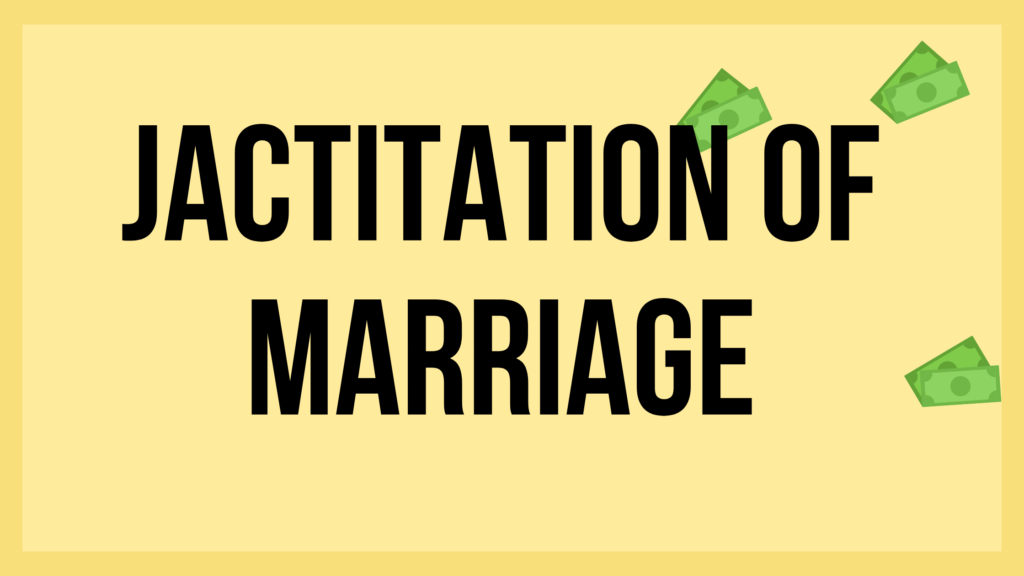- +92 333 1127830
- info@qanoonhouse.com
- Qanoon House, T-219, Supreme Corner, Jauhar Chowrangi, Block 17, Gulistan-e-Jauhar, Karachi, Pakistan
Jactitation Of Marriage
JACTITATION OF MARRIAGE: UNDERSTANDING THE CONCEPT AND LEGAL IMPLICATIONS
Marriage is a sacred and legally binding union between two individuals. However, in some cases, individuals may falsely claim to be married or publicize a non-existent marriage, causing confusion and potential harm to others involved. This act of falsely asserting the existence of a marriage is known as “jactitation of marriage.” In this article, we delve into the concept of the jactitation of marriage, its legal implications, and how it is addressed in different jurisdictions. Jactitation of marriage refers to the unwarranted boasting or public declaration of a non-existent marriage. It involves making false claims about being married to a specific individual without any valid legal or religious basis. This act can be done with various intentions, such as seeking social status, financial gain, or manipulating the emotions of others.
To address the jactitation of marriage, legal systems have established mechanisms to protect individuals from false claims and preserve the integrity of the institution of marriage. In many jurisdictions, defamation laws can be applied to hold individuals accountable for making false claims about marriage that harm the reputation or rights of others. Defamation lawsuits can be initiated to seek compensation for damages caused by such false assertions.

JACTITATION OF MARRIAGE IN ISLAM
In Islamic law, the jactitation of marriage, or false claims of marriage, is considered deceptive and goes against the principles of honesty and integrity. Islam places a strong emphasis on the importance of truthful communication and discourages falsehood in all aspects of life, including matters related to marriage. According to Islamic teachings, it is forbidden to falsely assert a marital relationship with someone to whom one is not truly married. Making false claims of marriage is considered a violation of trust, potentially leading to confusion, harm, and damage to the reputation of the individuals involved.
While Islamic law does not provide specific penalties or legal mechanisms solely addressing the jactitation of marriage, the principles of honesty, truthfulness, and the prohibition of deceit guide the approach to such situations. Individuals who engage in the jactitation of marriage may be seen as acting in violation of Islamic principles and may face moral and social consequences within their communities

MOTIVES BEHIND THE JACTITATION OF MARRIAGE
FINANCIAL GAIN
Some individuals may engage in the jactitation of marriage to deceive others and exploit financial benefits associated with being married, such as inheritance rights, joint assets, or access to shared resources.
SOCIAL STATUS AND REPUTATION
False claims of marriage can be driven by a desire to enhance one’s social standing or reputation within a community. By projecting a false image of being married, individuals may seek validation or garner respect from others.
Legal Services
Our Attorney

Popular Service
Provincial Tax Authorities
Misc. Services
Recent Article
EMOTIONAL MANIPULATION
Jactitation of marriage can be used as a tool to emotionally manipulate others, particularly in romantic relationships. By falsely claiming to be married or engaged, individuals may exert control or elicit specific responses from their partners.
SETTLING PERSONAL SCORES
In some cases, the jactitation of marriage may be motivated by a desire to harm or embarrass someone else. Making false claims about a non-existent marriage can be a way to discredit or tarnish the reputation of an individual, particularly in the context of personal conflicts or rivalries.
CONCEALING PERSONAL CIRCUMSTANCES
Individuals may engage in the jactitation of marriage to hide their true relationship status or personal circumstances. This could be driven by reasons such as avoiding social stigma, concealing extramarital affairs, or protecting personal privacy.
IMMIGRATION OR CITIZENSHIP BENEFITS
Jactitation of marriage may be motivated by the desire to obtain immigration or citizenship benefits in certain jurisdictions. By falsely claiming to be married to a citizen or permanent resident, individuals may try to gain legal status or residency rights.
ATTENTION-SEEKING OR VALIDATION
Some individuals may engage in the jactitation of marriage to attract attention or seek validation from others. By presenting themselves as married, they may hope to receive admiration, sympathy, or support from their social circle.
CULTURAL OR SOCIAL PRESSURE
Cultural or societal expectations around marriage and family life can also play a role in motivating jactitation. Individuals may feel compelled to present themselves as married due to cultural norms or pressures from their community.
PERSONAL INSECURITY OR LOW SELF-ESTEEM
Jactitation of marriage can be driven by personal insecurities or low self-esteem, where individuals believe that being married will validate their worth or improve their self-image in the eyes of others.
LEGAL IMPLICATIONS OF JACTITATION OF MARRIAGE
DEFAMATION
Jactitation of marriage can give rise to potential defamation claims. Making false claims about being married to someone can harm their reputation by spreading false information that may negatively impact their personal or professional life
FRAUDULENT MISREPRESENTATION
Engaging in the jactitation of marriage can be considered a form of fraudulent misrepresentation. By falsely asserting the existence of a marriage, individuals may deceive others and induce them to enter into legal or financial arrangements based on false information.


CONTRACTUAL OBLIGATIONS
False claims of marriage can have implications for various contractual obligations. For instance, if someone falsely represents themselves as married, it can affect matters such as insurance policies, joint bank accounts, or beneficiary designations, potentially leading to legal disputes.
FAMILY LAW PROCEEDINGS
In cases involving child custody, spousal support, or property division, false claims of marriage can significantly impact legal proceedings. It may lead to confusion regarding the true marital status and affect the distribution of assets, determination of support obligations, or custody arrangements.
ANNULMENT
Jactitation of marriage may provide grounds for an annulment, as it involves misrepresentation or fraud regarding the existence of a valid marriage. An annulment declares the marriage void from its inception, treating it as if it never legally existed.
CRIMINAL OFFENSES
In some jurisdictions, knowingly making false statements about marital status for personal gain can be considered a criminal offense. This may lead to charges related to fraud, perjury, or false swearing, depending on the specific laws of the jurisdiction.
PROPERTY AND INHERITANCE RIGHTS
False claims of marriage can impact property and inheritance rights. If someone falsely asserts a marriage, it may affect the distribution of marital assets or inheritance rights of others, leading to legal disputes and potential challenges to the validity of wills or estate plans
IMMIGRATION CONSEQUENCES
Jactitation of marriage can have serious immigration implications. Making false claims about being married to a citizen or permanent resident can lead to immigration fraud allegations, potentially resulting in the denial of immigration benefits or even deportation.
PERSONAL AND EMOTIONAL CONSEQUENCES
Beyond the legal implications, the jactitation of marriage can have profound personal and emotional consequences. It can lead to broken trust, damaged relationships, and psychological distress for individuals who are deceived by false claims of marriage.
